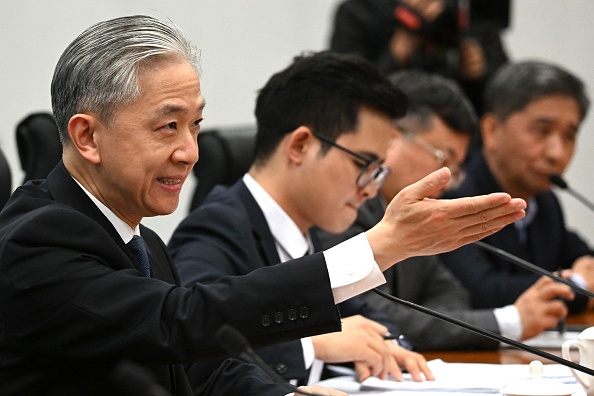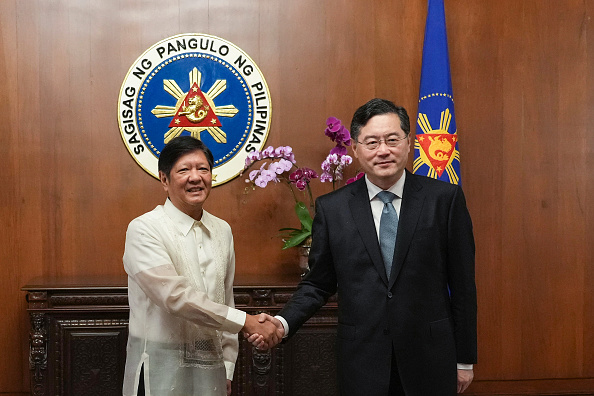
 Diplomatic Dance
Diplomatic DanceOver a month after Chinese President Xi Jinping's summit in Moscow with Russia's leader Vladimir Putin, Xi and Ukrainian President Volodymyr Zelensky spoke by telephone in the first known contact between the two leaders since Russia's invasion of Ukraine.
Zelensky had long requested a call with Xi and reported they "had a long and meaningful phone call." The Chinese state news media said the two leaders discussed "the Ukraine crisis" and their nations' bilateral relationship.
Xi reiterated that China's "core position" was to "promote peace and talks." Xi also said "mutual respect for sovereignty and territorial integrity" was the "political basis of China-Ukrainian relations."
While there were no concrete outcomes, much of the Western world welcomed the call for its potential to increase dialogue toward resolving Russia's brutal war in Ukraine.
The call took place days after China's Ambassador to France Lu Shaye caused a firestorm in Europe after he denied the sovereignty of post-Soviet nations in an interview, saying they "did not have effective status."
Rumors have since circulated that the Xi-Zelensky call may have been in response to the uproar, which is perceived as having damaged China's efforts to portray itself as a neutral party.
In recent months, China has been playing the role of peacemaker by helping restore diplomatic ties between Saudi Arabia and Iran and by rolling out the red carpet in Beijing for visiting world leaders such as President Emmanuel Macron of France.
However, analysts have expressed that a diplomatic breakthrough in the war in Ukraine is unlikely, given how far apart Moscow and Kyiv's positions remain, especially on the issue of Russian-occupied Ukrainian territory.
Learn more in "Xi-Putin Summit: Symbolic on the Surface, but Deeper Underneath?," by Richard Weitz, a Senior Fellow at the Hudson Institute.
 Tech Tensions
Tech TensionsChina is being increasingly isolated by Western powers in its access to advanced technology. While Germany reportedly considers ways to block the export of certain chemicals, the United States has moved to prevent China from purchasing the most advanced semiconductors, out of concerns for national security.
Nine Republican senators wrote a letter urging the Biden administration to impose sanctions on Chinese cloud service providers, saying they "are increasingly engaging with foreign entities - in some cases sanctioned foreign entities - that are directly challenging the national security and economic security interests of the United States and our allies and partners."
China has dismissed those concerns, calling the moves "containment measures" and accusing the United States of "technological terrorism" and unfairly hindering its economic growth.
Meanwhile, German Chancellor Olaf Scholz's office recently issued a statement that it is not currently pursuing any plans for an export ban on chip chemicals to China, in response to a report that the German government was considering restrictions on the chemicals in order to reduce Germany's exposure to China.
China is responding to these measures by expanding its local semiconductor industry to meet the growing demand for chips from the region's carmakers and electronics companies. Chinese chipmaking suppliers and state-backed funds plan to spend an estimated 50 billion yuan ($7.26 billion) to strengthen the domestic supply chain as the U.S. curbs tech exports.
Learn more in "Weathering the Storm: Chinese Chipmakers Respond to U.S. Export Controls," by Justin Feng, a Masters Student at the Johns Hopkins School of Advanced International Studies.
 Trilateral Strains
Trilateral StrainsPhilippines President Ferdinand Marcos Jr. and his foreign secretary met with Chinese Foreign Minister Qin Gang in Manila late last week in efforts to resolve the increasingly strained relations between the two countries, particularly due to territorial disputes in the South China Sea and Manila's deepening military collaboration with the United States.
Both countries committed to establishing "more lines of communication," to iron out maritime issues, but China has also continued to warn against the U.S.-Philippine security alliance interfering in territorial disputes in the region.
The Philippines' decision of granting U.S. forces additional access to local military camps has drawn criticism from China. Additionally, a recent incident between a Chinese coast guard ship and a Philippine patrol vessel, following joint military exercises between U.S. and Philippine forces, has only exacerbated tensions between Manila and Beijing.
China's concerns have increased over the Philippines' growing defense ties with the U.S., accusing Manila of "stoking the fire" in territorial disputes in the region and interfering in China's affairs with Taiwan. However, the Philippines National Security Council reiterated that the country has no intention of interfering in the Taiwan issue, claiming that EDCA sites are not intended for offensive operations against China or for interference in other territorial issues.
Marcos Jr. will also hold talks with Biden in Washington on May 1, which a White House official said is in an attempt to reaffirm its "ironclad commitments to the defense of the Philippines." Analysts have noted that it may be time for China to reevaluate its strategy and approach to Sino-Philippine relations.
Learn more in "Questions Raised as the U.S. Expands Military Access in the Philippines," by Lucio Blanco Pitlo III, a Research Fellow at the Asia-Pacific Pathways to Progress.
Prepared by China-US Focus editorial teams in Hong Kong and New York, this weekly newsletter offers you snap shots of latest trends and developments emerging from China every week, while adding a dose of historical perspective.
- 2023-04-21 Constructive and Fair
- 2023-04-14 Shoulder-to-Shoulder
- 2023-04-07 Push and Pull
- 2023-03-31 Tsai in Transit
- 2023-03-24 A Changing World
- 2023-03-17 Peacemaker Xi
- 2023-03-10 Party Time
- 2023-03-03 “An Existential Struggle”
- 2023-02-24 Opposing Worldviews
- 2023-02-17 Ripple Effects
- 2023-02-10 Ballooning Tensions
- 2023-02-03 Hot Air
- 2023-01-27 Spheres of Influence
- 2023-01-20 China's Davos Pitch
- 2023-01-13 Strategic Encounters
- 2023-01-06 Common Challenges
- 2022-12-23
- 2022-12-16 All in On Africa
- 2022-12-09 Seeking Stabilization
- 2022-12-02 Turf Tension
